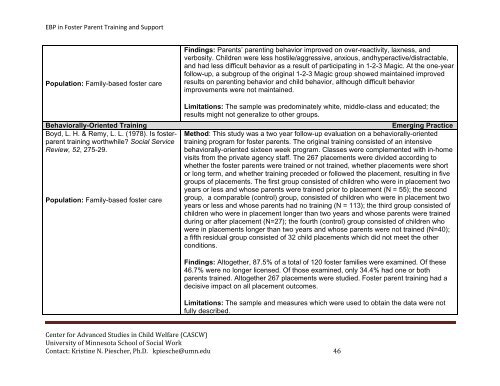Evidence-Based Practice in Foster Parent Training and Support ...
Evidence-Based Practice in Foster Parent Training and Support ...
Evidence-Based Practice in Foster Parent Training and Support ...
You also want an ePaper? Increase the reach of your titles
YUMPU automatically turns print PDFs into web optimized ePapers that Google loves.
EBP <strong>in</strong> <strong>Foster</strong> <strong>Parent</strong> Tra<strong>in</strong><strong>in</strong>g <strong>and</strong> <strong>Support</strong>Population: Family-based foster careF<strong>in</strong>d<strong>in</strong>gs: <strong>Parent</strong>s’ parent<strong>in</strong>g behavior improved on over-reactivity, laxness, <strong>and</strong>verbosity. Children were less hostile/aggressive, anxious, <strong>and</strong>hyperactive/distractable,<strong>and</strong> had less difficult behavior as a result of participat<strong>in</strong>g <strong>in</strong> 1-2-3 Magic. At the one-yearfollow-up, a subgroup of the orig<strong>in</strong>al 1-2-3 Magic group showed ma<strong>in</strong>ta<strong>in</strong>ed improvedresults on parent<strong>in</strong>g behavior <strong>and</strong> child behavior, although difficult behaviorimprovements were not ma<strong>in</strong>ta<strong>in</strong>ed.Limitations: The sample was predom<strong>in</strong>ately white, middle-class <strong>and</strong> educated; theresults might not generalize to other groups.Behaviorally-Oriented Tra<strong>in</strong><strong>in</strong>g Emerg<strong>in</strong>g <strong>Practice</strong>Boyd, L. H. & Remy, L. L. (1978). Is fosterparenttra<strong>in</strong><strong>in</strong>g worthwhile? Social Service tra<strong>in</strong><strong>in</strong>g program for foster parents. The orig<strong>in</strong>al tra<strong>in</strong><strong>in</strong>g consisted of an <strong>in</strong>tensiveMethod: This study was a two year follow-up evaluation on a behaviorally-orientedReview, 52, 275-29.behaviorally-oriented sixteen week program. Classes were complemented with <strong>in</strong>-homevisits from the private agency staff. The 267 placements were divided accord<strong>in</strong>g towhether the foster parents were tra<strong>in</strong>ed or not tra<strong>in</strong>ed, whether placements were shortor long term, <strong>and</strong> whether tra<strong>in</strong><strong>in</strong>g preceded or followed the placement, result<strong>in</strong>g <strong>in</strong> fivegroups of placements. The first group consisted of children who were <strong>in</strong> placement twoyears or less <strong>and</strong> whose parents were tra<strong>in</strong>ed prior to placement (N = 55); the secondPopulation: Family-based foster care group, a comparable (control) group, consisted of children who were <strong>in</strong> placement twoyears or less <strong>and</strong> whose parents had no tra<strong>in</strong><strong>in</strong>g (N = 113); the third group consisted ofchildren who were <strong>in</strong> placement longer than two years <strong>and</strong> whose parents were tra<strong>in</strong>eddur<strong>in</strong>g or after placement (N=27); the fourth (control) group consisted of children whowere <strong>in</strong> placements longer than two years <strong>and</strong> whose parents were not tra<strong>in</strong>ed (N=40);a fifth residual group consisted of 32 child placements which did not meet the otherconditions.F<strong>in</strong>d<strong>in</strong>gs: Altogether, 87.5% of a total of 120 foster families were exam<strong>in</strong>ed. Of these46.7% were no longer licensed. Of those exam<strong>in</strong>ed, only 34.4% had one or bothparents tra<strong>in</strong>ed. Altogether 267 placements were studied. <strong>Foster</strong> parent tra<strong>in</strong><strong>in</strong>g had adecisive impact on all placement outcomes.Limitations: The sample <strong>and</strong> measures which were used to obta<strong>in</strong> the data were notfully described.Center for Advanced Studies <strong>in</strong> Child Welfare (CASCW)University of M<strong>in</strong>nesota School of Social WorkContact: Krist<strong>in</strong>e N. Piescher, Ph.D. kpiesche@umn.edu 46
















